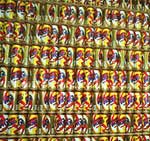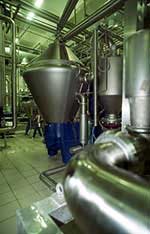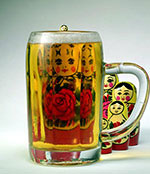Russian brewery Baltika
Started in St. Petersburg in 1990, the Baltika Brewery has become one of the biggest economic success stories of the post-Soviet period. In its short history, Baltika has managed to establish itself as the leading brewer in Russia, and its impressive expansion looks set to continue.
DATE 2023-11-28 AUTHOR Tobin AubinBeginning with just under 1 percent of Russia’s beer market in 1991, the company has achieved a steady year-on-year growth that has taken it to the country’s leading position with a total market share of 23 percent. Baltika owns breweries in St.Petersburg, Rostov-on-Don and Tula, and new plants are under construction in Samara and Khabarovsk. In 2001, the company sold 14,006 million hectoliters of beer.
 This 32 percent rise over the previous year’s sales volume was just another in a series of giant leaps forward made by the company.
This 32 percent rise over the previous year’s sales volume was just another in a series of giant leaps forward made by the company.
Two factors explain much of this success: the company’s stated goal of providing high-quality beers at reasonable prices, and its readiness to invest substantially in the state-of-the-art modern technology and production facilities that are needed to make that goal a reality.
Solid reputation for quality
Boris Rykunov, Baltika’s technical director, describes this commitment to lifting the Russian brewing industry from its antiquated Soviet past to the cutting edge of the 21st century. “Baltika is technically equipped to a higher standard than many Western firms,” he says. “We’ve always equipped our breweries with the very latest technology and we’re continually updating them. At all the breweries that we’ve modernized, and at the new breweries that we’re now building from scratch, you won’t find a single piece of old equipment.”
This investment in manufacturing technology and facilities – 105 million U.S. dollars in 2001 alone and a total of USD 420 million since 1996 – has helped the company develop a solid reputation for quality that has proved a massive hit with consumers. It’s no accident that vodka and cigarette manufacturers, unconnected to the real Baltika, have tried to market their wares under the Baltika brand name and logo. It’s also no accident that Baltika has been characteristically aggressive in fighting these illegal practices in court.
Despite the impressive rate of growth that the company has already demonstrated, work remains to be done. By expanding into the south of Russia with the development of a brewery in Rostov-on-Don, and into the far east of Russia with a new plant being built in Khabarovsk, Baltika is now attempting to cover Russia’s enormous territorial expanse.
Yearly expansion
And as if the task of territorial expansion wasn’t enough, the company is faced with a Russian beer market that is continuing to expand at a brisk pace. While Western countries can boast  consumption figures of around 80 liters of beer per person and year, Russia can at present only lay claim to figures of 41 liters per person and year.
consumption figures of around 80 liters of beer per person and year, Russia can at present only lay claim to figures of 41 liters per person and year.
But Russian beer consumption has been rising sharply since 1996, when Russians, on average, were drinking just 15 liters of beer per year. Market analysts are predicting that the rise will continue, in which case Baltika will have to expand its production volumes intensively each year just to hang on to the market share that it already has. Even in this context, Rykunov is quick to point out that the company isn’t resting on its laurels. “Our aim is to increase our market share to 25 percent by building two new breweries and by increasing the production volumes at our existing plants,” he says. “Usually we set our goals for increasing capacity in the autumn, and try to meet them by the start of the next sales season.
Single technical policy
Baltika’s annual report for 2001 echoes this message and sets out its approach for achieving the goals set. The development of capacity “will be achieved by implementing a single technical policy, by which the company opts for time-tested equipment and contractors providing high-quality work. ”Rykunov continues the theme of expansion with reference to the company ’s work with Alfa Laval. “Alfa Laval is our partner and they’ve been with us, side by side, from the very beginning. That partnership is continuing, even at our new breweries. You have to use tried and tested people. At the new breweries, we’ve taken those firms that we have confidence in and that we’re convinced won’t let us down – Alfa Laval is one of those firms.”
Going West
Increasing production volumes and moving into new territories aren’t the only changes to have taken place at Baltika in the last few years. The brewery now offers over 20 varieties of beer, as well as a selection of soft drinks. The original Baltika brand of beers remains by far the most popular in the brewery’s range, but in 1998 the Don brand, featuring four beers, was introduced to cater for preferences in southern Russia. Further market research and the identification of another niche in the market led to the creation of the “Arsenalnoye” brand at the brewery in Tula.
Boris Rykunov says that there now is a tendency to move towards lighter beers in Russia. Following that principle, Baltika has introduced three lighter “beer cocktails”: Baltika Cherry, Baltika Lemon, and Orange and Coffee, registering an alcohol content of about 2.8 percent vol. respectively.
Quadrupled exports
Russian tastes have also been followed – specifically the Russian love of honey – with the introduction of two Medovoye (“Honey”) beers. Only introduced in 2001, they have already captured 3.4 percent of the total Russian market, and now account for 15.4 percent of the company’s total volume of sales. Despite what has already been achieved and the enormous challenges ahead, Baltika does not restrict itself to the Russian market that it dominates. In 2001, the company created an independent export division.
By the end of the year, exports had quadrupled to 410,000 hectoliters which was 50 percent of all beer exported from Russia. If Baltika’s rates of growth in Russia are matched in the future by its exports to the West, the competition best beware – the Russians really are coming.
1st Class Preferred Supplier
Alfa Laval is the main supplier for the process area of the Baltika Brewery in St. Petersburg.
The company's responsibility comprises engineering, equipment supply, commissioning and site supervision, including integration and collaboration with other suppliers. The total value of Alfa Laval's deliveries to the St Petersburg plant amounts to 20 million euros (almost 20 million U.S. dollars).
Supplies of equipment manufactured by Alfa Laval include:
- Wort distribution systems,
- Yeast pitching systems,
- SCANDI BREW ® Yeast propagation plants,
- SCANDI BREW ®Yeast storage plants,
- Yeast cooling module,
- Spent yeast plant including thermolysers,
- BREW 2000 high-speed separators – pre-clarifiers,
- CARBOBLEND blending module,
- ALDOX water deaeration module,
- Pasteurizers (plate heat exchangers),
- Routing and piping systems in fermentation and bright beer area,
- Complete automation in bright beer area and fermentation area,
- Full control automation system type Brewmaxx in bright beer area and fermentation,
- Valve clusters for wort distribution systems, for filter feeding lines and yeast recovering lines,
- CIP stations.
Demanding selection criteria
Boris Rykunov, technical director of the Baltika brewery, sets out Baltika's approach to selecting equipment and technology.
"We don't go to one company for everything, and we're always wary of turnkey solutions," he says. "We evaluate all the suppliers that we work with for their specific strengths. We get better results with companies that are specialized and have strengths in concrete fields, making high quality reliable products. We also hold full tenders for every single project to make sure we're getting the best equipment."
The criteria for selecting suppliers, then, are extremely demanding, but Rykunov also notes that Alfa Laval equipment is used at all of Baltika's breweries, including the new ones under construction. Alfa Laval separators come in for particular praise.
"Alfa Laval is world famous for them. During the Soviet era, it was the only equipment that came from Sweden, and if you said that you had some Swedish equipment, everyone knew you were talking about Alfa Laval separators, and they've kept up their standards in that field," says Rykunov.
Rykunov also gives Alfa Laval high praise for its cylindro-conical tanks with routing systems and automation, heat exchangers, SCANDI BREW yeast propagation plants and CIP stations.
Problem solving – the key
In addition, Rykunov expresses admiration for innovations and advances made by Alfa Laval in the development of its technology. "Alfa Laval staff have a great way of explaining and presenting their latest innovations, and their system for taking samples, which we've recently installed, has been a great success," he says. "It's designed in such a way that there are almost no zones that can't be cleaned, so there are no dead zones. We're now fitting it at our new breweries, because improving quality and lowering costs are now separate lines in our budget."
Rykunov also has warm words for the personnel that install the equipment and resolve any eventual problems. "We're so used to some of their specialists that we specifically request them by name right at the contract-signing stages," he says. "You always have problems – the key is how you resolve those problems.
When we first worked with Alfa Laval, we saw the way they reacted and tried to solve those difficulties for us, and it got to the point where we could even understand them with-out words."

